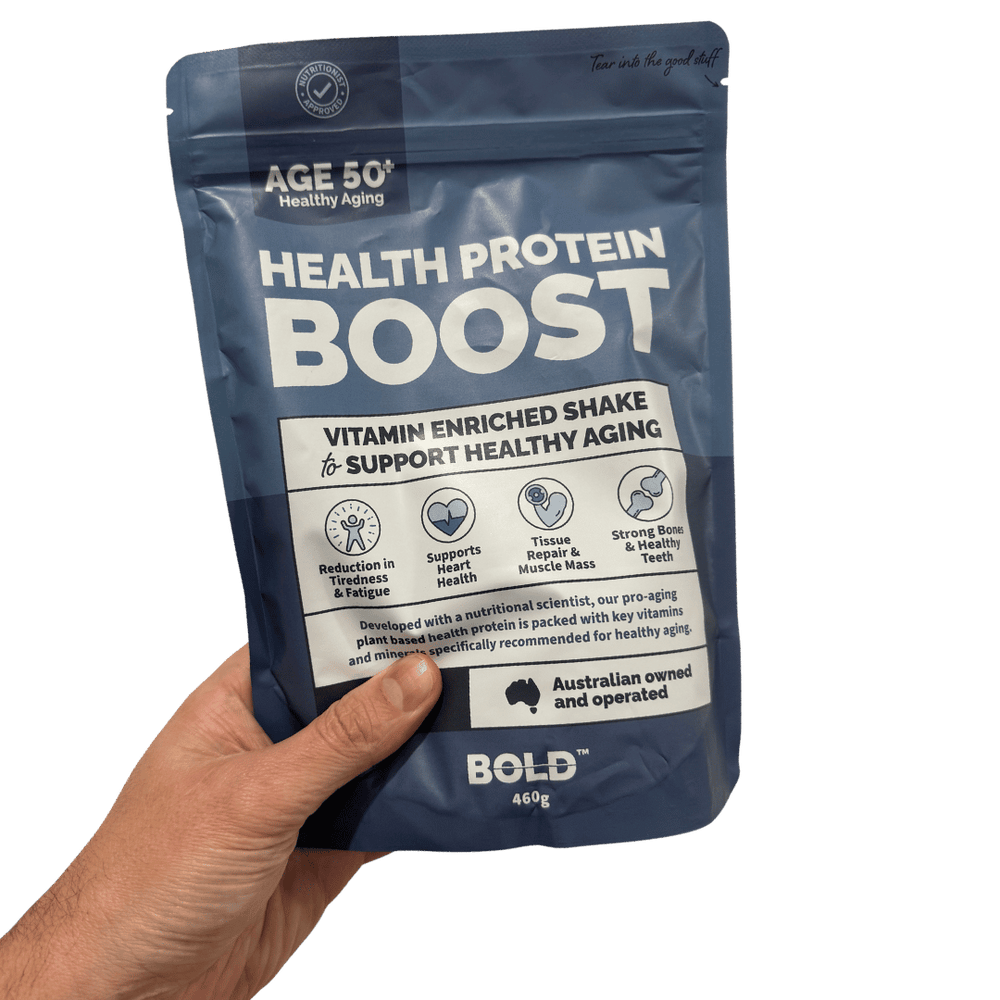5 Reasons to Eat More Plant-Based Protein: Health Benefits & Easy Ideas
Why eating more plant based protein could be advantageous for your health in general

Topics covered:
-
What are plant based proteins?
-
Benefits of plant based protein
-
Nourishes your gut health
-
Can help reduce inflammation in your body
-
Good for heart health, cholesterol and blood sugar levels
-
Contains valuable phytonutrients and antioxidants
-
Can help you feel full and maintain muscle mass
- How to include more plant based protein in your diet
You might be thinking, "Why would I want to eat more plant-based protein?"
Plant-based proteins have been gaining traction in the nutrition world, and for good reason. Studies show that they are lower in calories than animal based options while still providing enough amino acids to build muscle—all without sacrificing taste or variety! But this is just one of the many benefits.
In this article we'll talk about the 5 reasons why eating more plant based protein could be advantageous for your health in general as well as cover some tips on how best incorporate them into everyday life.
What are plant based proteins?
Technically, plant-based protein can be sourced from any plant. However, there are certain foods that contain higher amounts of plant based proteins than others. These include:
- Nuts and nut butters
- Legumes such as edamame, beans, peas or lentils,
- Seeds such as chia, hemp, and pumpkin
- Grains such as quinoa and brown rice
- Green vegetables like kale, broccoli or spinach
- Yogurt made from plant-based milk such as almond, soy or coconut
You can now also get plant-based protein powders. Over the past few years, these have been steadily increasing in popularity due to their preferred health benefits.
There are a variety of different types including brown rice, pea protein, hemp powder, soy, pumpkin seed, and chia seeds. Often a manufacturer will combine 2 or 3 different plants in one product to ensure you get a complete protein blend containing all 9 essential amino acids.
Benefits of plant based protein
The recent shift towards vegan or vegetarian diets can be attributed in part by its proven health benefits - both mental and physical! Plant based protein is a great option for those who want to eat more healthily, maintain a balanced diet and reduce their environmental impact. Here are just 5 of the benefits of plant based protein.
1. Nourishes your gut health
Plant protein is high in fibre, in particular prebiotic fibre. This fibre is important for maintaining a healthy gut microbiome.
So why's this important? Well, evidence now strongly suggests that a healthy microbiome is linked to improved energy, better mental health, and a stronger immune system.
Prebiotic fibre's main role is to help fuel the good bacteria in your gut. When we do this, the bacteria will produce beneficial short chain fatty acids (SCFAs). It’s these SCFAs that help support gut health by nourishing its cells, reducing inflammation and maintaining a healthy gut lining.
Fibre is also important for maintaining healthy bowel habits and regularity. In turn this can help prevent bowel related diseases such as bowel cancer.
2. Can help reduce inflammation in your body
The risk of chronic inflammation appears to naturally increase with age.
Recent studies have also shown that people who eat more animal protein and processed meats can have higher levels of inflammation in their body. Inversely, these studies found a plant-based protein diet helped reduce this.
The risk of heart disease, high blood pressure, diabetes, some cancers, Alzheimer’s Disease and arthritis have all been linked to an increase in inflammation.
There is increasing evidence to support that plant-based diets can not only help reduce one's risk of these conditions but also help improve symptoms of those who already have a diagnosis. For example, one study found arthritis patients had a significant improvement in pain and joint stiffness following a plant protein diet.
3. Good for your heart health, cholesterol and blood sugar levels
Plant-based protein may be good for the heart, your cholesterol and diabetes!
A recent review found that people who ate diets high in animal protein had a higher rate of cardiovascular disease whereas those who ate more plant based protein had a lower risk. Another study found those who ate more plant based protein had a lower risk of stroke and death from heart disease.
A plant-based protein diet may also result in an improvement in cholesterol and blood sugar levels. This is possibly because plant protein contains less saturated fat and cholesterol than animal protein.
4. Plant protein contains valuable phytonutrients and antioxidants
Phytonutrients are a natural compound found only in plant protein and other plant based foods. They have antioxidant and anti-inflammatory properties to help support a healthy body. These antioxidants are what helps defend the body from illnesses like cancer, heart disease and diabetes.
In addition to this, phytonutrients contain carotenoids and flavonoids which provide the body with additional health benefits. For instance, carotenoids help support the body’s immune system and eye health. Whereas flavonoids have been shown to help prevent cardiovascular disease and cancers.
In fact, flavonoids have proven to be so beneficial for the body, that they are now being manufactured into a variety of nutraceutical, pharmaceutical, medicinal and cosmetic applications.
5. Can help you feel full and maintain muscle mass
When it comes to protein it’s important to look at protein as a package. Plant-based proteins tend to be lower in calories than other sources of protein. It’s still however able to provide a sense of satiety and fullness so you aren’t left feeling hungry and wanting more.
Here’s an example for you - one cup of cooked lentils provides 18 grams of plant based protein, zero grams of fat and only 230 calories while the same amount of ground beef contains 29 grams protein, nine grams total fat (four from saturated fats) and 370 calories.
A study by the Harvard Chan School of Public Health backs this finding that plant-based protein can assist in weight loss. They followed the diet and lifestyle habits of over 120,000 men and women for up to 20 years.
They looked at how small changes contributed to weight gain over time. People who ate more red meat weighed one pound more every four years. Those who ate more plant-based protein weighed half a pound less every four years.
How to include more plant based protein in your diet
The easiest way to include plant based proteins into your diet is to add plant-based sources such as nuts, seeds, beans, peas, and grains into your meals and snacks.
Here are some easy ideas that may help inspire you:
- Add a plant-based protein powder like BOLD Health Protein Plus to your smoothie and use a milk alternative like almond milk
- Take your breakfast bowl to the next level with some hemp or chia seeds and a dollop of tasty nut butter.
- Make a Spicy Veggie Burrito Bowl with Edamame beans, quinoa and green veggies.
- Get fancy with a Vegetarian Sushi Bowl made with Tempeh & Tofu Nori
In Summary
You’ll find a lot of benefits by eating more plant-based protein in your diet. From the increased energy to better gut and heart health. If you still need inspiration on how to add more plant based protein into your diet, check out our recipes using Bold Health Protein powder.

References
https://www.ncbi.nlm.nih.gov/pmc/articles/PMC6245118/
https://insight.microba.com/blog/your-gut-bacterias-superpower-butyrate/
https://www.ncbi.nlm.nih.gov/pmc/articles/PMC3735932/
https://www.webmd.com/digestive-disorders/what-to-know-short-chain-fatty-acids
https://www.bowelcanceraustralia.org/facts
https://www.liebertpub.com/doi/epdf/10.1089/107555302753507195
https://www.ncbi.nlm.nih.gov/pmc/articles/PMC5850851/
https://jamanetwork.com/journals/jamainternalmedicine/fullarticle/2540540
https://www.hsph.harvard.edu/nutritionsource/what-should-you-eat/protein/
https://www.healthline.com/nutrition/antioxidants-explained
https://www.betterhealth.vic.gov.au/health/healthyliving/antioxidants
https://pubmed.ncbi.nlm.nih.gov/12134711/
----------------------------------------------------------------------------------------------------------
Medical Disclaimer
The information provided in this blog post is for general information only, it is not intended as medical advice. For medical advice please consult with a qualified medical professional who is familiar with your individual medical needs.


